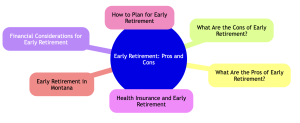Getting Familiar with Early Retirement
Early retirement is becoming a popular trend among many individuals seeking to enjoy more freedom and flexibility in their later years.
This decision has significant advantages and potential drawbacks, so it’s important to carefully weigh both sides.
If you have been considering early retirement, or you’re determined to retire early and want to know what to expect, this article from Montana Elder Law should provide some insights.
Key Takeaways
- Early retirement can offer increased personal freedom and time for hobbies.
- It requires substantial financial planning to sustain a longer retirement period.
- Health insurance coverage is critical before Medicare eligibility.
- Social Security benefits are reduced if taken early.
- Potential loss of professional identity and social connections.

What Are the Pros of Early Retirement?
The most significant benefit of early retirement is obvious – a new lease on life – freedom to pursue your interests or fancies every day.
Without the constraints of a 9-to-5 job, you have more time to pursue hobbies, travel, or even start a new venture. This newfound flexibility allows for self-discovery and enjoying activities that might have been difficult to engage in while working full-time.
Moreover, early retirement can lead to improved mental health and stress reduction.
Leaving the workforce earlier can mean less exposure to work-related stress and more time to focus on physical activities and healthy living. This can result in a better overall quality of life, with more time to spend with family and friends, engage in community activities, and maintain a healthier lifestyle.
Discussing the benefits of early retirement often highlights how personal freedom and health improvements significantly enhance life satisfaction during retirement years.
What Are the Cons of Early Retirement?
Retiring early has its allure, but it also comes with significant challenges. One major drawback is the financial risk involved.
Retiring early means you need a larger retirement fund to cover a longer period without a steady income.
Additionally, early withdrawal from retirement accounts can lead to penalties and tax implications, reducing your savings. It’s essential to have a robust financial plan to avoid running out of funds. This includes accounting for unexpected expenses and inflation, which can erode your purchasing power over time.
Social aspects also play a critical role in the cons of early retirement. Leaving the workforce early can result in decreased social interaction and a loss of professional identity.
Work often provides a sense of purpose and community, and its absence can affect mental well-being. The transition from a structured routine to an open schedule requires adjustment and can lead to feelings of isolation or boredom if not appropriately managed.
Financial Considerations for Early Retirement
Planning for early retirement involves meticulous financial planning to cover an extended retirement period, healthcare costs, and inflation. A comprehensive financial plan is crucial to effectively address these aspects.1)
Relevant Financial Strategies
| Strategy | Description | Impact on Early Retirement |
| Saving 25x annual expenses | Accumulate 25 times yearly expenses | Provides a financial cushion |
| 4% withdrawal rule | Withdraw no more than 4% of savings annually | Helps prevent depleting funds too early |
| Health savings account (HSA) | Contribute to an HSA for future medical costs | Ensures funds for healthcare before Medicare eligibility |
Health Insurance and Early Retirement
Securing health insurance before becoming eligible for Medicare at age 65 is crucial for those considering early retirement. There is often a significant gap in health insurance coverage, and having adequate coverage is necessary to avoid high medical costs.
Several options are available to bridge this gap:
- Employer-sponsored retiree health plans: Some employers offer continued health coverage for retirees.
- COBRA continuation coverage: Allows you to keep your employer’s health plan for a limited time after leaving your job.
- Private health insurance: Purchasing a private plan can provide coverage until Medicare eligibility.
- Affordable Care Act (ACA) marketplace plans: ACA plans offer a range of coverage options with potential subsidies.
- Health sharing ministries: Faith-based programs where members share medical costs.
How to Plan for Early Retirement
Setting Financial Goals
Setting clear financial goals is essential for a successful early retirement.
Start by defining your retirement age and determining how much you need to save to maintain your desired lifestyle. This includes calculating your expected annual expenses and multiplying this by the number of years you expect to live in retirement.
Factor in inflation and unforeseen expenses to create a realistic savings target. A well-defined financial plan will help you stay on track and make informed decisions about your retirement.
Investment Strategies
Growing your retirement savings requires effective investment strategies.
Diversify your portfolio to include a mix of stocks, bonds, and other investment vehicles that align with your risk tolerance and retirement timeline.
Consider maximizing contributions to retirement accounts like 401(k)s and IRAs, which offer tax advantages and potential employer-matching contributions.
Additionally, explore investing in real estate or starting a business to create additional income streams. A strategic approach to investments can significantly boost your retirement savings and help you reach your goals faster.
Budgeting for Early Retirement
Managing your expenses efficiently is critical when planning for early retirement. Here are some practical budgeting tips:
- Track your spending: Monitor your expenses to identify areas where you can cut costs.
- Prioritize savings: Allocate a portion of your income to savings and investments before spending on non-essential items.
- Reduce debt: Pay off high-interest debt to free up more money for savings.
- Adjust your lifestyle: Consider downsizing your home or adopting a more frugal lifestyle to save more money.
- Plan for healthcare: Budget for healthcare expenses, which can be significant in retirement.
Early Retirement in Montana
Retiring early in Montana offers a unique blend of benefits and challenges.
Cost of Living in Montana
Montana’s cost of living is generally lower than the national average, making it an attractive option for retirees.
Housing costs are relatively affordable, though they vary by region.
Healthcare costs are also competitive, but it’s important to plan for these expenses as they can add up over time.
Popular Retirement Communities in Montana
Montana boasts several popular retirement communities that offer a range of amenities.
Bozeman is known for its scenic beauty and vibrant cultural scene, making it a favorite among retirees.
Missoula offers a mix of outdoor activities and healthcare facilities, ideal for active retirees.
Billings is the largest city in Montana and provides a variety of services, including excellent healthcare and recreational opportunities.
These communities cater to different lifestyles and preferences, ensuring that retirees can find the perfect place to settle down.
Retirement Planning with Montana Elder Law
Early retirement is an increasingly popular option for those who wish to live freely as soon as possible. If you develop smart financial habits, it can be achievable without major sacrifices. Keep in mind the lifestyle changes as well as the financial challenges. Many people face boredom but many others thrive.
If you need any legal advice about retiring in Montana, Montana Elder Law is a trusted local resource with deep roots all over the Big Sky State. Call today with questions!
Reference:
(1) SSA, Early or Late Retirement?, https://www.ssa.gov/oact/quickcalc/early_late.html




